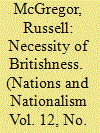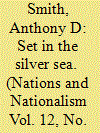|
|
|
Sort Order |
|
|
|
Items / Page
|
|
|
|
|
|
|
| Srl | Item |
| 1 |
ID:
071636


|
|
|
| 2 |
ID:
071637


|
|
|
|
|
| Publication |
2006.
|
| Summary/Abstract |
The English and the French are both former imperial peoples, and to that extent they share certain features of national identity common to peoples who have had empires. That includes a 'missionary' sense of themselves, a feeling that they have, or have had, a purpose in the world wider than the concerns of non-imperial nations. I argue that nevertheless the English and the French have diverged substantially in their self-conceptions. This I put down to a differing experience of empire, the sense especially among the French that the British were more successful in their imperial ventures. I also argue that contrasting domestic histories - evolutionary in the English case, revolutionary in that of the French - have also significantly coloured national identities in the two countries. These factors taken together, I argue, have produced a more intense sense of nationhood and a stronger national consciousness among the French than among the English.
|
|
|
|
|
|
|
|
|
|
|
|
|
|
|
|
| 3 |
ID:
071645


|
|
|
|
|
| Publication |
2006.
|
| Summary/Abstract |
The ongoing, post-war construction of Albanian martyrs, memory and the nation in Kosovo has produced iconic tropes of militant resistance, unity and national independence. This critical interpretive account, based on years of the authors' ethnographic and political engagement with Albanians in post-war Kosovo, focuses on the making of a master narrative that is centred on the 'sublime sacrifice' of the insurgent KLA leader Adem Jashari, known as the 'Legendary Commander'. It also aims to trace voices of discord with this master narrative, testing contestations in terms of the rural-urban, political and gender divides in Kosovo-Albanian society. It concludes that the narrow international view of Albanians as either 'victims' or 'perpetrators' has contributed to the consolidation of this powerful narrative, its celebration of Albanian agency in militant resistance and the closing of public debate within Albanian society.
|
|
|
|
|
|
|
|
|
|
|
|
|
|
|
|
| 4 |
ID:
071644


|
|
|
|
|
| Publication |
2006.
|
| Summary/Abstract |
Until the last third of the twentieth century, Britishness figured prominently in the national identity of Australians. Many scholars of Australian nationalism have assumed an inherent antipathy between British and Australian solidarities; others have appreciated that there was a degree of mutuality between the two; few have explained why. This article offers such an explanation. It focuses on the crucial nation-building period twenty years on either side of the federation of the Australian colonies in 1901. Drawing on ethno-symbolist approaches to nationalism, it argues that Britishness provided the necessary ethno-cultural foundations for Australian nationhood, the only available repertoire of myth and symbol that could fulfil the nationalist aspiration for unity. Yet Britishness in the antipodes was significantly different to that of the British Isles, as were the civic/territorial components of Australian conceptions of nationhood, giving rise to a distinctive British-Australian composite nationalism.
|
|
|
|
|
|
|
|
|
|
|
|
|
|
|
|
| 5 |
ID:
071643


|
|
|
|
|
| Publication |
2006.
|
| Summary/Abstract |
The relationship between national identity and how people perceive and consume media is a central but largely untested assumption of studies of nationalism. Using a previously developed classification of identity among English migrants to Scotland, this paper explores associations between how people use the media and how they make sense of their national identity. Compared with Scottish nationals, who tend to adopt a more taken-for-granted and uncontentious view of the media, except when they feel that the media presented to them challenge their sense of identity, English migrants find that the agendas of the media in Scotland differ from those they are used to south of the border. Specifically, how they view the media tends to vary according to whether they view themselves as 'English', 'British' or as 'becoming Scottish'.
|
|
|
|
|
|
|
|
|
|
|
|
|
|
|
|
| 6 |
ID:
071642


|
|
|
|
|
| Publication |
2006.
|
| Summary/Abstract |
This article compares the ways in which references to 'the (British) Empire' were constructed and used in interview accounts of national identity and domestic politics in Scotland and in England. In Scotland, spontaneous accounts of Empire were typically formulated in conjunction with nationalist moral meta-narratives. Respondents variously inferred heroic national character from Scotland's role in Empire, or cast Scottish history as an enduring struggle between progressive forces of nationalism and atavistic forces of Anglo-British colonialism. The construct of Britishness was often seen to derive from, and to be synonymous with, the history of Empire. In England, the Empire story tended to be framed within anti-nationalist meta-narratives. Imperialism was generally understood to represent a product of excessive nationalism, and tales of Empire were used to draw exemplary moral lessons concerning the deficiencies of Anglo-British national character and of the catastrophic consequences of the pursuit of national self-interest more generally. The existence of Britain, and the construct of Britishness, were generally understood to both predate and postdate the history of Empire.
|
|
|
|
|
|
|
|
|
|
|
|
|
|
|
|
| 7 |
ID:
071638


|
|
|
|
|
| Publication |
2006.
|
| Summary/Abstract |
Although many short-term reasons for a specifically English Euro-scepticism have been proposed, a long-term perspective is required to provide a fuller and more rounded treatment of this important and topical political issue. It needs to be grasped in terms of cultural, political and religious factors in English history, specifically, the antiquity and political character of a sense of English national identity, on the one hand, and on the other hand, the nature and impact of Protestant covenantalism. Among the factors that have shaped a sense of English national identity are its insular, geopolitical situation, the early development of a centralised English state, and the concomitant growth of a unified English legal system. To the existing sense of national identity under the Tudors was added a strong current of religious separatism, manifested first through Henry VIII's break with Rome and his vindication of monarchical supremacy in a national church, and second through the Puritan return to the idea of election modelled on the Old Testament narrative of the Exodus and Covenant of the Israelites. These currents have lent to the sense of English national identity a strong oppositional character, in contrast to the transterritorialism of Christendom characteristic of the leading Roman Catholic powers. This can be seen both by comparing English with French historical trajectories, and more recently, in terms of the separate, but allied, position of England in relation to European integration.
|
|
|
|
|
|
|
|
|
|
|
|
|
|
|
|
|
|
|
|
|